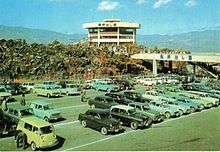1964 in Japan
Events in the year 1964 in Japan. It corresponds to Shōwa 39 (昭和39年) in the Japanese calendar.
| |||||
| Decades: |
| ||||
|---|---|---|---|---|---|
| See also: | Other events of 1964 History of Japan • Timeline • Years | ||||
1964 is considered a seminal year in modern Japanese history. The Tokyo Olympics and first run of the bullet train reflected a society-wide sense that post-war reconstruction was over and that Japan had rejoined the international family of nations. Diplomatic negotiations underway this year between South Korea and Japan resulted in a formal normalization of relations the following year.
Individuals born beginning around this date were often subsequently identified as "shinjinrui" (or new people) because they had not experienced the suffering older generations had during World War II or the post-war period, and on the contrary, grew up in material plenty.
Incumbents
- Emperor: Hirohito[1]
- Prime Minister: Hayato Ikeda (L–Hiroshima, 3rd term) until November 9, Eisaku Satō (L–Yamaguchi)
- Chief Cabinet Secretary: Yasumi Kurogane (L–Yamagata) until July 18, Zenkō Suzuki (L–Iwate) until November 9, Tomisaburō Hashimoto (L–Ibaraki)
- Chief Justice of the Supreme Court: Kisaburō Yokota
- President of the House of Representatives: Naka Funada (L–Tochigi)
- President of the House of Councillors: Yūzō Shigemune (L–national)
- Diet sessions: 46th (regular session opened in December 1963, to June 26), 47th (extraordinary, November 9 to December 18), 48th (regular, December 21 to 1965, June 1)
Events

- March 18: Hayakawa Electric (the predecessor of today's Sharp) and Sony announce that they have completed a prototype electronic calculator using Japanese-manufactured diodes and transistors.
- March 24: U.S. ambassador Edwin Reischauer is stabbed by a Japanese youth.
- April 1: Japanese citizens are permitted to freely travel overseas.
- April 12: Channel 12, the predecessor of TV Tokyo, begins operations.
- April 17 – Orient Lease, as predecessor of Orix Group founded in Osaka.
- April 29 - The Keiō Dōbutsuen Line opens.
- June 16: An earthquake in Niigata Prefecture kills 12.
- July 18: A heavy rain, following devastate flood and landslide in Shimane and Tottori Prefecture, at least 128 people lives.
- August 18 – The International Olympic Committee bans South Africa from the Tokyo Olympics on the grounds that its teams are racially segregated.
- September 17: The Tokyo Monorail begins operations.
- October 1: The Tōkaidō Shinkansen begins operations.
- October 10–24: 1964 Summer Olympics held in Tokyo. Judo introduced for the first time as an Olympic Game.
- October 25: Ikeda Hayato resigns as prime minister; Eisaku Satō is elected to replace him.
- November 9: Sato announces his first cabinet.
- November 17: The political party Komeito is formed.
- December 23: Tokyo Metro Tōzai Line was opened.
Births
- January 1: Akemi Masuda, athlete
- January 4: Riki Takeuchi, actor
- January 25: Seiko Senou, actor of 1987 Metal Hero Series Choujinki Metalder.
- March 8: Hiroshi Tsuburaya, actor of 1984 Space Sheriff Series Uchuu Keiji Shaider (d. 2001).
- March 12: Kaori Ekuni, author
- March 18:
- Mika Kanai, voice actress and singer
- Yoko Kanno, pianist and songwriter
- April 23: Rie Ishizuka, voice actress
- May 5: Minami Takayama, singer and voice actress
- May 22: Daisuke Shima, actor of 1988 Super Sentai Series of Last Showa Series of Choujuu Sentai Liveman as Red Falcon/Yuusuke Amamiya as OP and ED Himself Performing.
- May 31: Yukio Edano, politician
- June 22: Hiroshi Abe, model and actor
- July 9: Kazumi Kawai, actress (d. 1997)
- July 19: Masahiko Kondō, solo singer of Johnny & Associates
- July 24: Banana Yoshimoto, author
- July 25: Reiko Takashima, actress
- August 10: Hiro Takahashi, singer, lyricist, and composer (d. 2005)
- September 13: Junko Mihara, politician, former singer, and actress
- September 23: Koshi Inaba, singer of B'z
- October 5:
- Seiko Hashimoto, ice speed skater
- Megumi Yokota, one of the North Korean abductee victims of the late 1970s (d. ca. 1977?)
- October 12: Masaru Ogawa, figure skater
- October 18: Etsuko Inoue, tennis player
- October 20: Tomoko Yamaguchi, actress
- October 24: Kotaro Tanaka, actor of 1991 Super Sentai Chōjin Sentai Jetman as Red Hawk/Ryu Tendou.
- November 4: Yūko Mizutani, voice actress (d. 2016)
- December 13: hide, musician (d. 1998)
- December 23: Kazuhiro Koshi, skeleton racer
- December 28: Kaori Yamaguchi, judoka
Deaths
- February 8: Boshirō Hosogaya, admiral (b. 1888)
- February 17: Chūichi Hara, admiral (b. 1889)
- April 5: Tatsuji Miyoshi, poet, literary critic, and editor (b. 1900)
- May 6: Haruo Satō, novelist and poet (b. 1892)
- May 8: Kichisaburo Nomura, politician and military leader (b. 1877)
- August 17: Keiji Sada, actor (b. 1926)
- November 29: Ryūsaku Tsunoda, educator and historian (b. 1877)
Statistics
- Yen value: US$1 = ¥360 (fixed)
References
- "Hirohito | Biography, Accomplishments, & Facts". Encyclopedia Britannica. Retrieved 27 March 2019.
